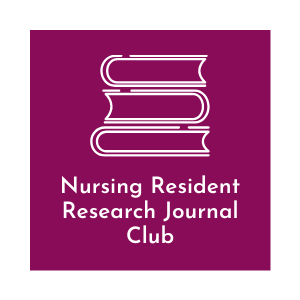
Note: all meetings will be held via WebEx until further notice. Please register in Learn@Lee. If LIVE class is available it will be noted in Learn@Lee. The WebEx link will be sent automatically by email when you register for the meeting.
*An updated list of upcoming club meetings is available in the Learn@Lee Health event calendar.
Description
Target Audience: Present and past nursing interns, however, any nurse who is interested in the topic is welcome to attend.
Purpose: The Nursing Resident Research Journal Club strives to introduce nursing research that provides information related to the needs of the newly-licensed nurses.
Educational Objectives:
- To enhance nurses’ knowledge of the research process
- To enhance nurses’ ability to critically evaluate published nursing research
- To develop an awareness of current nursing research studies
- To evaluate current practice based on evidence-based nursing research results
- To further develop and enhance critical thinking skills
- To enable nurses in acute-care areas an opportunity to participate and network in a journal club that focuses on their specific needs
- To motivate nurses to participate in evidence-based practice and/or nursing research projects at Lee Health.
Desired outcomes: The desired outcome is to improve nurses’ understanding in developing evidence-based practice and conducting nursing research.
Format:
Register on Learn@Lee Health
Participants should read the article prior to attending the sessions.
Place: WebEx.
Reading assignments: Copies of the reading assignments will be distributed by the club coordinator prior to the meeting.
Available credits: Lee Health is an approved provider of Continuing Nursing Education by the Florida Board of Nursing. This program has applied for 1 (one) contact hour.
Leader: Debbie Fleming, MSN, RN, NPD-BC, RDS Clinical Learning Department
Previous Reading Assignments
2020
Cho, H. & Han, K. (2018). Associations among nursing work environment and health-promoting behaviors of nurses and nursing performance quality: A multilevel approach. Journal of Nursing Scholarship, 50 (4), 403-410.
Gardiner, I., & Shhen, J. (2017). Graduate nurses’ experience of feedback, support and anxiety: a pilot study. Australian Journal of Advanced Nursing, 35(1), 6-15
Lee, Y., Dai, Y., Chang, MH., Chang, YC., Yao, KG., & Liu MC. (2017). Quality of work like, nurses’ intention to leave the profession, and nursing leaving the profession: A one-year prospective survey. Journal of Nursing Scholarship, 49(4), 438-444.
2019
Van Bogaert, P., Peremans, L., Van Heusden, D., Verspuy, M., Kureckova, V., Van de Cruys, Z., & Franck, E. (2017). Predictors of burnout, work engagement and nurses reported job outcomes and quality of care: a mixed method study. BMC Nursing, 16(5), 1-14.
Jordan, T., Khubchandani, J., & Wiblishauser, M. (2016). The impact of perceived stress and coping adequacy on the health of nurses: A pilot investigation. Nursing Research and Practice, http://dx.doi.org/10.1155/2016/5843256.
Chesak, S., Bhagra, A., Schroeder, D., Foy, D., Cutshall, S., & Sood, A. Enhancing resilience among new nurses: Feasibility and efficacy of a pilot intervenion. The Ochsner Journal, 15(1), 38-44.
Medeiros da Silva, K., Figueredo De Martino, M., Cleia de Oiveira Viana, M., Bezerra, C., & Nunes Miranda, F., (2017). Relationship between work shifts and quality of sleep of nurses: a descriptive study. Online Brazilian Journal of Nursing. 16(1), 57-63.
2018
Magnusson C, Allan H, Horton K et al (2017) An analysis of delegation styles among newly qualified nurses. Nursing Standard, 31( 25), 46-53.
Weaver More, L., Leahy, C., Sublett, C., & Lanig, H. (2013). Understanding Nurse-to-Nurse Relationships and Their Impact on Work Environments. Med SurgNursing, 22(3), 172-179.
Laschinger, H., Wong, C., Regan, S., Young-Ritchie & Bushell, P. (2013). Workplace Incivility and New Graduate Nurses' Mental health The Protective Role of Resiliency. Journal of Nursing Administration, 43(7/8), 415-421.
Kuokkanen, L., Leino-Kilpli, H., Numminen, O., Isoaho, H., Flinkman, M., & Meretoja, R. (2016). Newly graduated nurses’ empowerment regarding professional competence and other work-related factors. BMC Nursing, 15(22).
St. Martin, L., Harripaul, A., Antonacci, R., Laframboise, D., & Pruden, M. (2015). Advanced beginner to competent practitioner: New graduate nurses perceptions of strategies that facilitate or hinder development. The Journal of Continuing Education in Nursing, 46(9), 392-400.
2017
Simons, S. & Sauer, P. (2013). An exploration of the workplace bullying experience. Journal for Nurses in Professional Development, 29(5), 228-232.
Zori, S. (2016). Teaching critical thinking using reflective journaling in a nursing fellowship program. The Journal of Continuing Education in Nursing, 47(7), 321-329.
Oh, Y. & Gastmans, C. (2015). Moral distress experienced by nurses: A quantitative literature review. Nursing Ethics, 22(1), 15-31.
St. Martin, L., Harripaul, A., Antonacci, R., Laframboise, D., & Pruden, M. (2015). Advanced beginner to competent practitioner: New graduate nurses perceptions of strategies that facilitate or hinder development. The Journal of Continuing Education in Nursing, 46(9), 392-400.
2016
Truglio-londrigan, M. (2015). The patient experience with shared decision making: A qualitative descriptive study. Journal of Infusion Nursing, 38(6), 407-418.
Harris, L. J. M. (2013). Caring and Coping: Exploring how nurses manage workplace stress. Journal of Hospice & Palliative Nursing, 15(8), 446-454.
Flynn, L., Yulan, L., Dickson, G. L., Xie, M. & Dong-Churl, S. (2012). Nurse practice environments, error interception practices, and inpatient medication errors. Journal of Nursing Scholarship, 44(2), 180-186.
Lancaster, G., Kolakowsky-Hayner, S., Kovacich, J. & Greer-Williams, N. (2015). Interdisciplinary communication and collaboration among physicians, nurses, and unlicensed assistive personnel. Journal for Nursing Scholarship, 47 (3), 275-284.
2015
Pantazopoulos, I., Tsoni A., Kouskouni, E., Papadimitriou, L., Johnson, E. O., & Xanthos, T. (2012). Factors influencing nurses' decision to activate medical emergency teams. Journal of Clinical Nursing, 21, 2668-2678.
Michaelson, J. J. (2012). Emotional distance to so-called difficult patients. Scandinavian Journal of Caring Sciences, 26, 90-97. doi: 10.1111/j.1471-6712.2011.00908.x
Happell, B., Dwyer, T., Reid-Searl, K., Burke, K.J., Caperchione, C. M. & Gaskin, C. J. (2013). Nurses and stress: Recognizing and seeking solutions. Journal of Nursing Management, 21, 638-647. doi: 10.1111/jonm.12037
Etienne, E. (2014). Exploring workplace bullying in nursing. Workplace Health & Safety, 62 (1), 6-11. doi: 10.3928/21650799-20131220-02